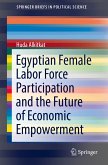During the second half of the twentieth century, the mainstream scholarship presented the democratization process as the outcome of domestic conditions not significantly influenced by actors outside the nation-state. With the end of the Cold War, this perspective was challenged as a result of the third wave of democratization, and the subsequent growth of the "good governance" discourse on the agenda of the international development establishment. The new perspective attached a more significant role to external factors in the democratization process than was originally conceptualized.
Dieser Download kann aus rechtlichen Gründen nur mit Rechnungsadresse in A, B, BG, CY, CZ, D, DK, EW, E, FIN, F, GR, HR, H, IRL, I, LT, L, LR, M, NL, PL, P, R, S, SLO, SK ausgeliefert werden.
"The book under review provides a rich empirical analysis of the international dimensions of democratization in Egypt ... . by furnishing a comprehensive historical overview of Egypt's struggle for democracy and ample empirical data on the international dimensions of Egypt's authoritarian resilience, Selim provides a valuable basis on which researchers interested in Egypt can build." (May Darwich, Middle East Journal, Vol. 70 (2), 2016)









